小学反意疑问句练习题
- 格式:doc
- 大小:41.50 KB
- 文档页数:8
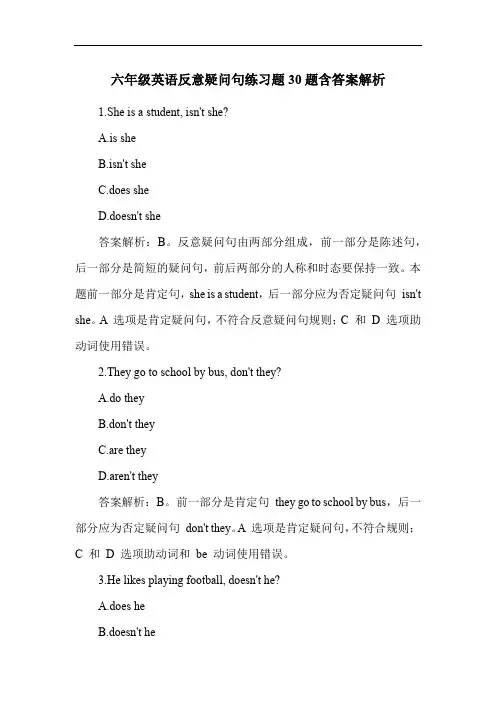
六年级英语反意疑问句练习题30题含答案解析1.She is a student, isn't she?A.is sheB.isn't sheC.does sheD.doesn't she答案解析:B。
反意疑问句由两部分组成,前一部分是陈述句,后一部分是简短的疑问句,前后两部分的人称和时态要保持一致。
本题前一部分是肯定句,she is a student,后一部分应为否定疑问句isn't she。
A 选项是肯定疑问句,不符合反意疑问句规则;C 和D 选项助动词使用错误。
2.They go to school by bus, don't they?A.do theyB.don't theyC.are theyD.aren't they答案解析:B。
前一部分是肯定句they go to school by bus,后一部分应为否定疑问句don't they。
A 选项是肯定疑问句,不符合规则;C 和D 选项助动词和be 动词使用错误。
3.He likes playing football, doesn't he?A.does heB.doesn't heC.is heD.isn't he答案解析:B。
前一部分是肯定句he likes playing football,后一部分应为否定疑问句doesn't he。
A 选项是肯定疑问句,不符合规则;C 和D 选项助动词和be 动词使用错误。
4.We have lunch at school, don't we?A.do weB.don't weC.have weD.haven't we答案解析:B。
前一部分是肯定句we have lunch at school,后一部分应为否定疑问句don't we。
C 和D 选项助动词使用错误。
5.My mother cooks delicious food, doesn't she?A.does sheB.doesn't sheC.is sheD.isn't she答案解析:B。
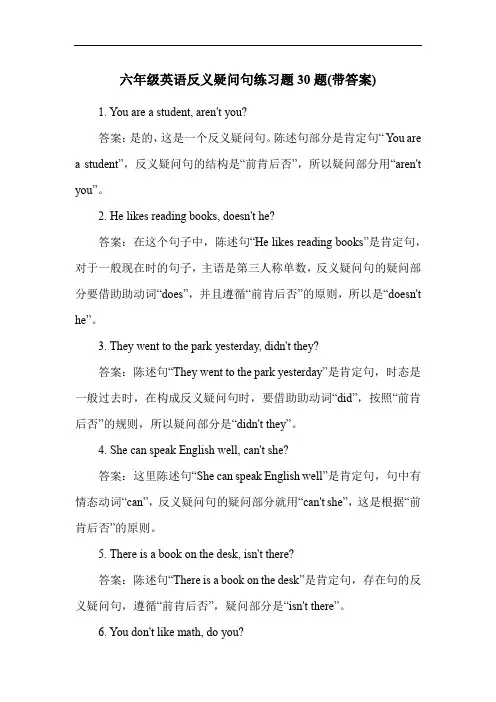
六年级英语反义疑问句练习题30题(带答案)1. You are a student, aren't you?答案:是的,这是一个反义疑问句。
陈述句部分是肯定句“ You are a student”,反义疑问句的结构是“前肯后否”,所以疑问部分用“aren't you”。
2. He likes reading books, doesn't he?答案:在这个句子中,陈述句“He likes reading books”是肯定句,对于一般现在时的句子,主语是第三人称单数,反义疑问句的疑问部分要借助助动词“does”,并且遵循“前肯后否”的原则,所以是“doesn't he”。
3. They went to the park yesterday, didn't they?答案:陈述句“They went to the park yesterday”是肯定句,时态是一般过去时,在构成反义疑问句时,要借助助动词“did”,按照“前肯后否”的规则,所以疑问部分是“didn't they”。
4. She can speak English well, can't she?答案:这里陈述句“She can speak English well”是肯定句,句中有情态动词“can”,反义疑问句的疑问部分就用“can't she”,这是根据“前肯后否”的原则。
5. There is a book on the desk, isn't there?答案:陈述句“There is a book on the desk”是肯定句,存在句的反义疑问句,遵循“前肯后否”,疑问部分是“isn't there”。
6. You don't like math, do you?答案:陈述句“You don't like math”是否定句,反义疑问句的结构是“前否后肯”,所以疑问部分是“do you”。
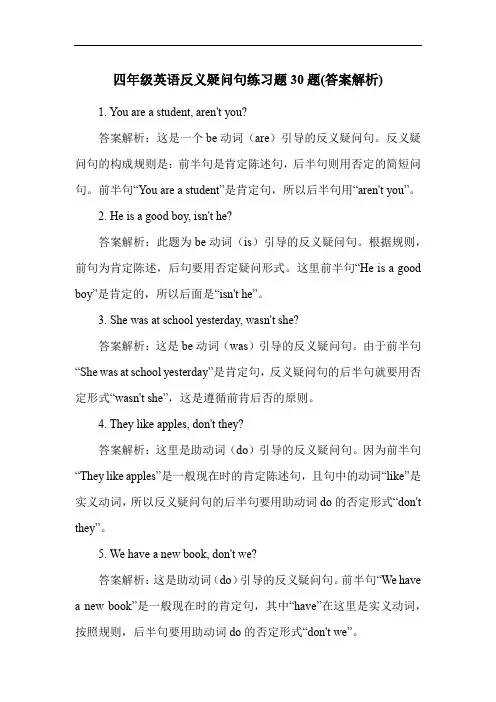
四年级英语反义疑问句练习题30题(答案解析)1. You are a student, aren't you?答案解析:这是一个be动词(are)引导的反义疑问句。
反义疑问句的构成规则是:前半句是肯定陈述句,后半句则用否定的简短问句。
前半句“You are a student”是肯定句,所以后半句用“aren't you”。
2. He is a good boy, isn't he?答案解析:此题为be动词(is)引导的反义疑问句。
根据规则,前句为肯定陈述,后句要用否定疑问形式。
这里前半句“He is a good boy”是肯定的,所以后面是“isn't he”。
3. She was at school yesterday, wasn't she?答案解析:这是be动词((was)引导的反义疑问句。
由于前半句“She was at school yesterday”是肯定句,反义疑问句的后半句就要用否定形式“wasn't she”,这是遵循前肯后否的原则。
4. They like apples, don't they?答案解析:这里是助动词((do)引导的反义疑问句。
因为前半句“They like apples”是一般现在时的肯定陈述句,且句中的动词“like”是实义动词,所以反义疑问句的后半句要用助动词do的否定形式“don't they”。
5. We have a new book, don't we?答案解析:这是助动词((do)引导的反义疑问句。
前半句“We have a new book”是一般现在时的肯定句,其中“have”在这里是实义动词,按照规则,后半句要用助动词do的否定形式“don't we”。
6. Tom can swim, can't he?答案解析:这是情态动词((can)引导的反义疑问句。
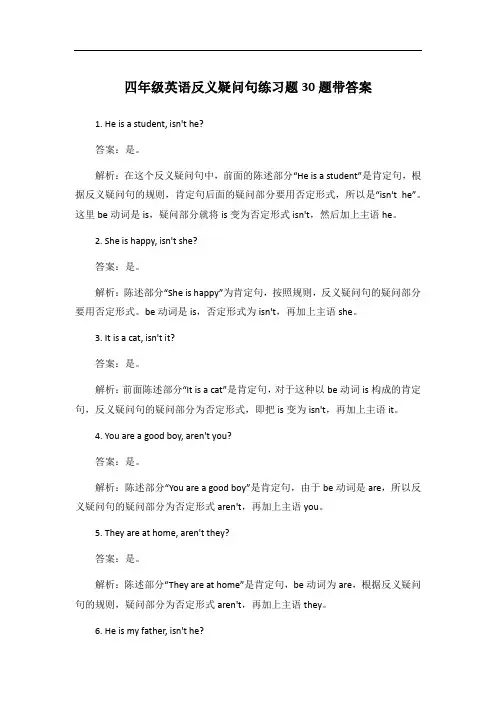
四年级英语反义疑问句练习题30题带答案1. He is a student, isn't he?答案:是。
解析:在这个反义疑问句中,前面的陈述部分“He is a student”是肯定句,根据反义疑问句的规则,肯定句后面的疑问部分要用否定形式,所以是“isn't he”。
这里be动词是is,疑问部分就将is变为否定形式isn't,然后加上主语he。
2. She is happy, isn't she?答案:是。
解析:陈述部分“She is happy”为肯定句,按照规则,反义疑问句的疑问部分要用否定形式。
be动词是is,否定形式为isn't,再加上主语she。
3. It is a cat, isn't it?答案:是。
解析:前面陈述部分“It is a cat”是肯定句,对于这种以be动词is构成的肯定句,反义疑问句的疑问部分为否定形式,即把is变为isn't,再加上主语it。
4. You are a good boy, aren't you?答案:是。
解析:陈述部分“You are a good boy”是肯定句,由于be动词是are,所以反义疑问句的疑问部分为否定形式aren't,再加上主语you。
5. They are at home, aren't they?答案:是。
解析:陈述部分“They are at home”是肯定句,be动词为are,根据反义疑问句的规则,疑问部分为否定形式aren't,再加上主语they。
6. He is my father, isn't he?答案:是。
解析:陈述部分“He is my father”为肯定句,be动词是is,反义疑问句的疑问部分为否定形式isn't,再加上主语he。
7. She is in the classroom, isn't she?答案:是。
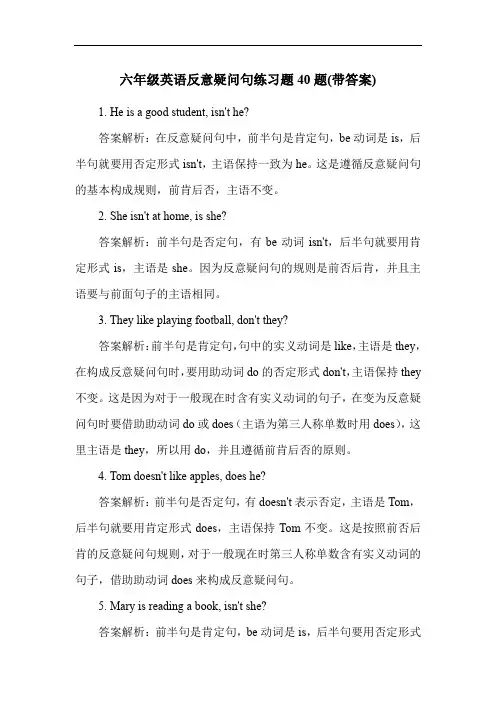
六年级英语反意疑问句练习题40题(带答案)1. He is a good student, isn't he?答案解析:在反意疑问句中,前半句是肯定句,be动词是is,后半句就要用否定形式isn't,主语保持一致为he。
这是遵循反意疑问句的基本构成规则,前肯后否,主语不变。
2. She isn't at home, is she?答案解析:前半句是否定句,有be动词isn't,后半句就要用肯定形式is,主语是she。
因为反意疑问句的规则是前否后肯,并且主语要与前面句子的主语相同。
3. They like playing football, don't they?答案解析:前半句是肯定句,句中的实义动词是like,主语是they,在构成反意疑问句时,要用助动词do的否定形式don't,主语保持they 不变。
这是因为对于一般现在时含有实义动词的句子,在变为反意疑问句时要借助助动词do或does( 主语为第三人称单数时用does),这里主语是they,所以用do,并且遵循前肯后否的原则。
4. Tom doesn't like apples, does he?答案解析:前半句是否定句,有doesn't表示否定,主语是Tom,后半句就要用肯定形式does,主语保持Tom不变。
这是按照前否后肯的反意疑问句规则,对于一般现在时第三人称单数含有实义动词的句子,借助助动词does来构成反意疑问句。
5. Mary is reading a book, isn't she?答案解析:前半句是肯定句,be动词是is,后半句要用否定形式isn't,主语是Mary。
因为反意疑问句中前肯后否,主语与前面句子一致。
6. We can sing English songs, can't we?答案解析:前半句是肯定句,有情态动词can,后半句就要用否定形式can't,主语是we。
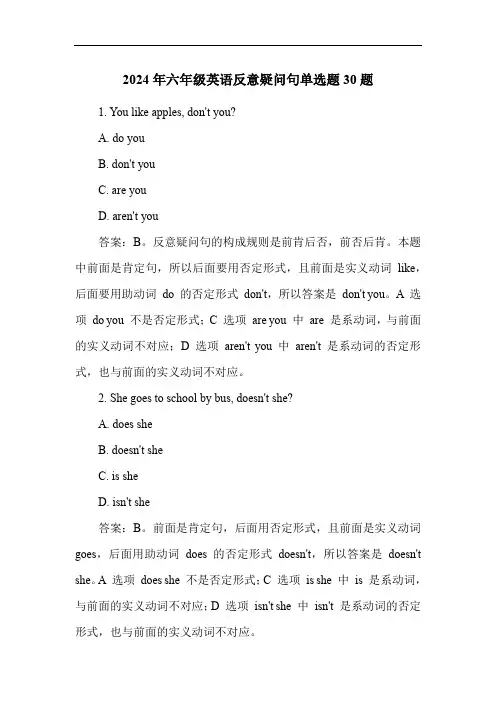
2024年六年级英语反意疑问句单选题30题1. You like apples, don't you?A. do youB. don't youC. are youD. aren't you答案:B。
反意疑问句的构成规则是前肯后否,前否后肯。
本题中前面是肯定句,所以后面要用否定形式,且前面是实义动词like,后面要用助动词do 的否定形式don't,所以答案是don't you。
A 选项do you 不是否定形式;C 选项are you 中are 是系动词,与前面的实义动词不对应;D 选项aren't you 中aren't 是系动词的否定形式,也与前面的实义动词不对应。
2. She goes to school by bus, doesn't she?A. does sheB. doesn't sheC. is sheD. isn't she答案:B。
前面是肯定句,后面用否定形式,且前面是实义动词goes,后面用助动词does 的否定形式doesn't,所以答案是doesn't she。
A 选项does she 不是否定形式;C 选项is she 中is 是系动词,与前面的实义动词不对应;D 选项isn't she 中isn't 是系动词的否定形式,也与前面的实义动词不对应。
3. They play football on weekends, don't they?A. do theyB. don't theyC. are theyD. aren't they答案:B。
前肯后否,前面是实义动词play,后面用助动词do 的否定形式don't,答案是don't they。
A 选项do they 不是否定形式;C 选项are they 中are 是系动词,不对应;D 选项aren't they 中aren't 是系动词的否定形式,不对应。
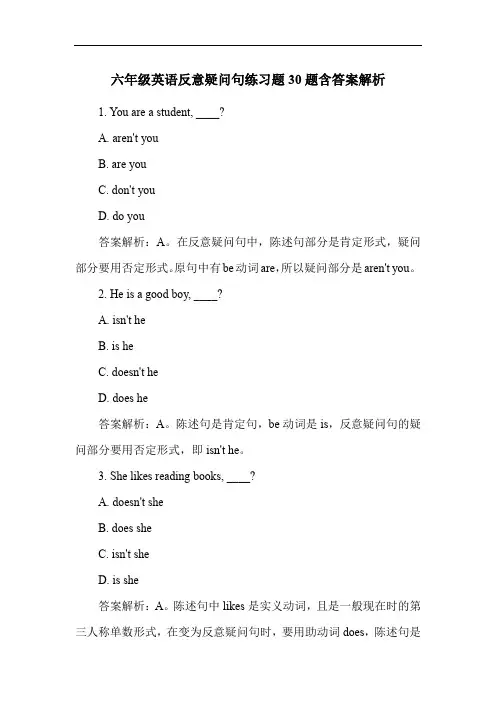
六年级英语反意疑问句练习题30题含答案解析1. You are a student, ____?A. aren't youB. are youC. don't youD. do you答案解析:A。
在反意疑问句中,陈述句部分是肯定形式,疑问部分要用否定形式。
原句中有be动词are,所以疑问部分是aren't you。
2. He is a good boy, ____?A. isn't heB. is heC. doesn't heD. does he答案解析:A。
陈述句是肯定句,be动词是is,反意疑问句的疑问部分要用否定形式,即isn't he。
3. She likes reading books, ____?A. doesn't sheB. does sheC. isn't sheD. is she答案解析:A。
陈述句中likes是实义动词,且是一般现在时的第三人称单数形式,在变为反意疑问句时,要用助动词does,陈述句是肯定句,所以疑问部分是否定形式doesn't she。
4. They play football every day, ____?A. don't theyB. do theyC. aren't theyD. are they答案解析:A。
原句中play是实义动词,一般现在时,主语是they,在构成反意疑问句时,要用助动词do,陈述句为肯定句,疑问部分为否定形式don't they。
5. There is a cat under the table, ____?A. isn't thereB. is thereC. doesn't thereD. does there答案解析:A。
陈述句是there be结构,这里是肯定句,be动词是is,反意疑问句的疑问部分为否定形式isn't there。
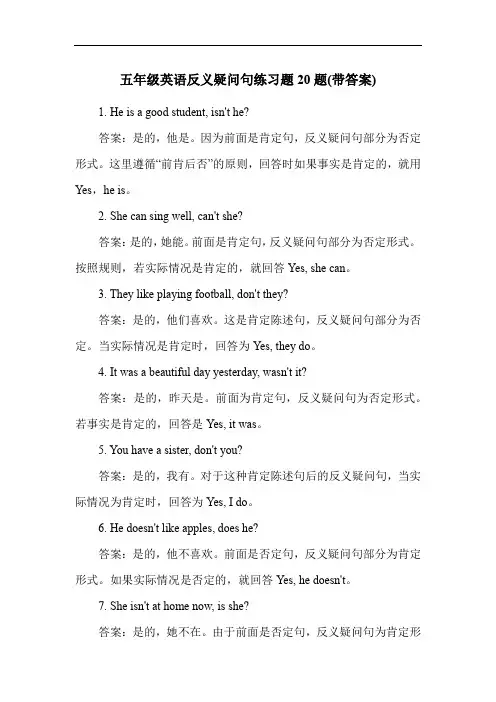
五年级英语反义疑问句练习题20题(带答案)1. He is a good student, isn't he?答案:是的,他是。
因为前面是肯定句,反义疑问句部分为否定形式。
这里遵循“前肯后否”的原则,回答时如果事实是肯定的,就用Yes,he is。
2. She can sing well, can't she?答案:是的,她能。
前面是肯定句,反义疑问句部分为否定形式。
按照规则,若实际情况是肯定的,就回答Yes, she can。
3. They like playing football, don't they?答案:是的,他们喜欢。
这是肯定陈述句,反义疑问句部分为否定。
当实际情况是肯定时,回答为Yes, they do。
4. It was a beautiful day yesterday, wasn't it?答案:是的,昨天是。
前面为肯定句,反义疑问句为否定形式。
若事实是肯定的,回答是Yes, it was。
5. You have a sister, don't you?答案:是的,我有。
对于这种肯定陈述句后的反义疑问句,当实际情况为肯定时,回答为Yes, I do。
6. He doesn't like apples, does he?答案:是的,他不喜欢。
前面是否定句,反义疑问句部分为肯定形式。
如果实际情况是否定的,就回答Yes, he doesn't。
7. She isn't at home now, is she?答案:是的,她不在。
由于前面是否定句,反义疑问句为肯定形式。
当事实是否定时,回答为Yes, she isn't。
8. They didn't go to school yesterday, did they?答案:是的,他们没去。
前面是否定句,反义疑问句为肯定形式。
若实际情况是否定的,回答是Yes, they didn't。
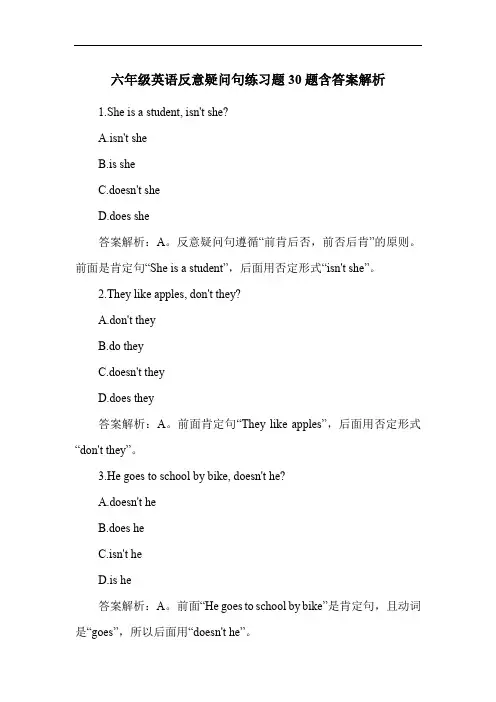
六年级英语反意疑问句练习题30题含答案解析1.She is a student, isn't she?A.isn't sheB.is sheC.doesn't sheD.does she答案解析:A。
反意疑问句遵循“前肯后否,前否后肯”的原则。
前面是肯定句“She is a student”,后面用否定形式“isn't she”。
2.They like apples, don't they?A.don't theyB.do theyC.doesn't theyD.does they答案解析:A。
前面肯定句“They like apples”,后面用否定形式“don't they”。
3.He goes to school by bike, doesn't he?A.doesn't heB.does heC.isn't heD.is he答案解析:A。
前面“He goes to school by bike”是肯定句,且动词是“goes”,所以后面用“doesn't he”。
4.We are happy, aren't we?A.aren't weB.are weC.don't weD.do we答案解析:A。
前面肯定句“We are happy”,后面用否定形式“aren't we”。
5.It is a dog, isn't it?A.isn't itB.is itC.doesn't itD.does it答案解析:A。
前面肯定句“It is a dog”,后面用否定形式“isn't it”。
6.She can swim, can't she?A.can't sheB.can sheC.doesn't sheD.does she答案解析:A。
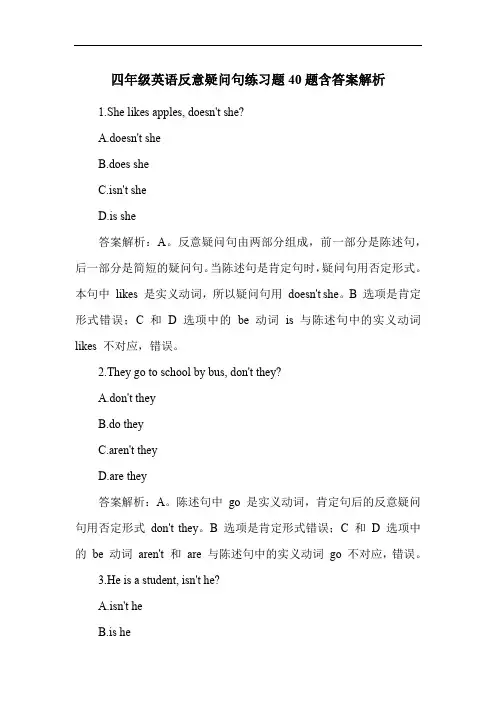
四年级英语反意疑问句练习题40题含答案解析1.She likes apples, doesn't she?A.doesn't sheB.does sheC.isn't sheD.is she答案解析:A。
反意疑问句由两部分组成,前一部分是陈述句,后一部分是简短的疑问句。
当陈述句是肯定句时,疑问句用否定形式。
本句中likes 是实义动词,所以疑问句用doesn't she。
B 选项是肯定形式错误;C 和 D 选项中的be 动词is 与陈述句中的实义动词likes 不对应,错误。
2.They go to school by bus, don't they?A.don't theyB.do theyC.aren't theyD.are they答案解析:A。
陈述句中go 是实义动词,肯定句后的反意疑问句用否定形式don't they。
B 选项是肯定形式错误;C 和D 选项中的be 动词aren't 和are 与陈述句中的实义动词go 不对应,错误。
3.He is a student, isn't he?A.isn't heB.is heD.does he答案解析:A。
陈述句中有be 动词is,肯定句后的反意疑问句用isn't he。
B 选项是肯定形式错误;C 和 D 选项中的doesn't 和does 与陈述句中的be 动词is 不对应,错误。
4.We have lunch at school, don't we?A.don't weB.do weC.haven't weD.have we答案解析:A。
陈述句中have 是实义动词,肯定句后的反意疑问句用否定形式don't we。
B 选项是肯定形式错误;C 和D 选项中的haven't 和have 与陈述句中的实义动词have( 吃)不对应,错误。
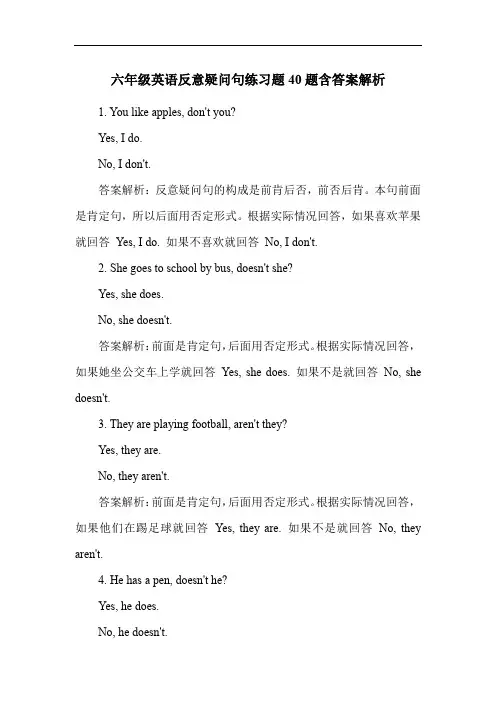
六年级英语反意疑问句练习题40题含答案解析1. You like apples, don't you?Yes, I do.No, I don't.答案解析:反意疑问句的构成是前肯后否,前否后肯。
本句前面是肯定句,所以后面用否定形式。
根据实际情况回答,如果喜欢苹果就回答Yes, I do. 如果不喜欢就回答No, I don't.2. She goes to school by bus, doesn't she?Yes, she does.No, she doesn't.答案解析:前面是肯定句,后面用否定形式。
根据实际情况回答,如果她坐公交车上学就回答Yes, she does. 如果不是就回答No, she doesn't.3. They are playing football, aren't they?Yes, they are.No, they aren't.答案解析:前面是肯定句,后面用否定形式。
根据实际情况回答,如果他们在踢足球就回答Yes, they are. 如果不是就回答No, they aren't.4. He has a pen, doesn't he?Yes, he does.No, he doesn't.答案解析:前面是肯定句,后面用否定形式。
根据实际情况回答,如果他有一支笔就回答Yes, he does. 如果没有就回答No, he doesn't.5. We are happy, aren't we?Yes, we are.No, we aren't.答案解析:前面是肯定句,后面用否定形式。
根据实际情况回答,如果我们开心就回答Yes, we are. 如果不开心就回答No, we aren't.6. You don't like oranges, do you?Yes, I do.No, I don't.答案解析:前面是否定句,后面用肯定形式。
反义疑问句题目
一、日常生活类
1. 你今天吃了好多冰淇淋,这对胃可不好,不是吗?
2. 他总是在睡觉,简直就是个瞌睡虫,不是吗?
3. 她每次逛街都要花好多钱,是个购物狂啊,不是吗?
4. 你刚刚说要减肥,可又吃了一大块蛋糕,不是吗?
5. 那只小狗超级可爱,每个人见了都会喜欢它,不是吗?
二、校园生活类
1. 小明数学考试总是不及格,他得好好努力学习数学了,不是吗?
2. 小红在课堂上老是讲话,这是违反纪律的,不是吗?
3. 老师布置的作业超级多,大家都觉得压力山大,不是吗?
4. 学校食堂的饭菜有时候很难吃,大家都这么说,不是吗?
5. 这个学霸每次考试都名列前茅,真的很厉害,不是吗?
三、娱乐类
1. 那部电影超级无聊,看的时候都想打瞌睡,不是吗?
2. 这个歌手的嗓音很独特,一听就忘不了,不是吗?
3. 那部电视剧的剧情太拖沓了,看得人很着急,不是吗?
4. 这个综艺节目总是有很多笑点,大家看的时候都笑得停不下来,不是吗?
5. 那个明星的演技很糟糕,演什么都一个样,不是吗?。
五年级英语反义疑问句练习题20题带答案1. You like reading books, don't you?A. Yes, I do.B. No, I don't.C. Yes, I am.D. No, I am not.答案解析:A。
反义疑问句前肯后否,前句是“You like reading books”,肯定句,所以后面用否定形式“don't you”。
回答根据实际情况,喜欢读书就用“Yes, I do”。
B 选项是否定回答,但如果不喜欢读书才用。
C 和D 选项的“am”与前句的“like”不对应。
2. She goes to school by bus, doesn't she?A. Yes, she does.B. No, she doesn't.C. Yes, she is.D. No, she is not.答案解析:A。
前句“She goes to school by bus”是肯定句,反义疑问句用“doesn't she”。
肯定回答用“Yes, she does”。
B 选项是否定回答,若不是坐公交上学用。
C 和 D 选项的“is”与前句的“goes”不对应。
3. They play football after school, don't they?A. Yes, they do.B. No, they don't.C. Yes, they are.D. No, they are not.答案解析:A。
前句“They play football after school”是肯定句,反义疑问句用“don't they”。
肯定回答用“Yes, they do”。
B 选项是否定回答,若不踢足球用。
C 和D 选项的“are”与前句的“play”不对应。
4. He has a new pencil, doesn't he?A. Yes, he does.B. No, he doesn't.C. Yes, he has.D. No, he has not.答案解析:A。
六年级英语反意疑问句练习题40题1.She is a student, isn't she?A.is sheB.isn't sheC.does sheD.doesn't she答案解析:B。
反意疑问句前肯后否,前面是is,后面也用isn't,主语是she,所以选isn't she。
A 选项是肯定形式,不符合要求;C 和D 选项分别用了does,与前面的is 不一致。
2.They like playing football, don't they?A.do theyB.don't theyC.are theyD.aren't they答案解析:B。
前肯后否,前面是like 动词原形,用助动词do,后面用don't they。
A 选项是肯定形式,不对;C 和D 选项are 和aren't 与前面的like 不对应。
3.The teacher is kind, isn't he/she?A.is he/sheB.isn't he/sheC.does he/sheD.doesn't he/she答案解析:B。
前肯后否,前面是is,后面用isn't,主语是the teacher,可以用he/she 来指代。
A 选项是肯定形式,错误;C 和D 选项的does 与前面的is 不匹配。
4.We have a lot of books, don't we?A.do weB.don't weC.have weD.haven't we答案解析:B。
前肯后否,前面是have 表示“有”,用助动词do,后面是don't we。
A 选项是肯定形式,不对;C 和D 选项的have 和haven't 容易混淆,但这里用助动词do 更合适。
5.There is a big tree in the schoolyard, isn't there?A.is thereB.isn't thereC.are thereD.aren't there答案解析:B。
四年级英语反意疑问句练习题40题(带答案)1. You like apples, don't you?答案:如果喜欢就回答Yes, I do. 如果不喜欢就回答No, I don't.解析:反意疑问句由两部分组成,前一部分是一个陈述句,后一部分是一个简短的疑问句。
这里陈述句是You like apples,简短疑问句是don't you。
回答时,Yes表示肯定前面陈述句的内容,No表示否定前面陈述句的内容。
2. He is a good boy, isn't he?答案:如果他是个好男孩就回答Yes, he is. 如果不是就回答No, he isn't.解析:在这个句子中,陈述句是He is a good boy,反意疑问句部分是isn't he。
当回答时,根据实际情况,如果事实是肯定的就用Yes 加肯定形式,如果事实是否定的就用No加否定形式。
3. It is a red flower, isn't it?答案:如果是红色的花就回答Yes, it is. 如果不是就回答No, it isn't.解析:句子的前半部分It is a red flower是陈述句,后半部分isn't it是反意疑问句。
回答时遵循Yes对应肯定事实,No对应否定事实的原则。
4. They play football every day, don't they?答案:如果他们每天踢足球就回答Yes, they do. 如果不踢就回答No, they don't.解析:陈述句They play football every day,反意疑问句部分是don't they。
回答这种反意疑问句时,根据实际情况,用Yes或No加上相应的助动词形式。
5. She has a cat, doesn't she?答案:如果她有猫就回答Yes, she does. 如果没有就回答No, she doesn't.解析:这里陈述句是She has a cat,因为has在这里是实义动词,所以反意疑问句部分是doesn't she。
六年级英语反义疑问句练习题30题1. You are a student, aren't you?答案:是的。
解析:在反义疑问句中,前半句是肯定句,这里的be动词是are,后半句就要用否定形式aren't,并且主语是you。
2. He is a good boy, isn't he?答案:是的。
解析:前半句为肯定句,be动词是is,所以后半句用否定形式isn't,主语为he。
3. They were at home yesterday, weren't they?答案:是的。
解析:前半句是肯定句,be动词是were,后半句则为否定形式weren't,主语是they。
4. She likes reading books, doesn't she?答案:是的。
解析:前半句是一般现在时的肯定句,主语是she,动词是likes( 第三人称单数形式),在反义疑问句中,助动词要用does,后半句为否定形式doesn't。
5. We play football on weekends, don't we?答案:是的。
解析:前半句是一般现在时的肯定句,主语是we,动词是play,在反义疑问句中,助动词用do,后半句为否定形式don't。
6. It was sunny yesterday, wasn't it?答案:是的。
解析:前半句是一般过去时的肯定句,be动词是was,后半句为否定形式wasn't,主语是it。
7. Tom has a dog, doesn't he?答案:是的。
解析:前半句是一般现在时的肯定句,主语是Tom第三人称单数),has在这里是实义动词“有”的意思,在反义疑问句中,助动词用does,后半句为否定形式doesn't。
8. My mother cooks well, doesn't she?答案:是的。
四年级英语反意疑问句练习题40题带答案1. She is a good student, ______?A. isn't sheB. is sheC. doesn't sheD. does she答案:A。
解析:在反意疑问句中,陈述部分是肯定句,后面的简短问句要用否定形式。
原句中有be动词is,所以简短问句就用isn't she。
2. He is happy, ______?A. isn't heB. is heC. doesn't heD. does he答案:A。
解析:陈述部分为肯定句,be动词是is,反意疑问句的简短问句部分要用否定形式,即isn't he。
3. It is a big cat, ______?A. isn't itB. is itC. doesn't itD. does it答案:A。
解析:这是一个主系表结构的句子,陈述部分是肯定的,简短问句要用否定形式,原句be动词是is,所以是isn't it。
4. They are friends, ______?A. aren't theyB. are theyC. don't theyD. do they答案:A。
解析:当陈述部分是主系表结构且为肯定句时,反意疑问句的简短问句要用否定形式,原句be动词是are,所以是aren't they。
5. You are late, ______?A. aren't youB. are youC. don't youD. do you答案:A。
解析:陈述部分是肯定句,be动词是are,反意疑问句的简短问句要用否定形式aren't you。
6. This is a book, ______?A. isn't thisB. is thisC. isn't itD. is it答案:C。
一、单选:(每题1分,共30分)1、Few of them hurt themselves in the accident last night,________A. don’t theyB. didn’t theyC. did theyD. do they2、-You’ve never seen dinosaur eggs, have you ?--_____. How I wish to visit the Dinosaur World.A. Yes, I haveB. No, I haven’tC. Certainly, I haveD. Of course, I haven’t3、His sister had a bad cough, ______she?A. wasn’tB. doesn’tC. hadn’tD. didn’t4、Mr. Green went to Shenzhen on business last week,________?A. isn’t heB. doesn’t heC. didn’t heD. hasn’t he5、ohn can hardly understand any Chinese, _________he?A. Can’tB. doesn’tC. canD. does6、Don’t smoke in the meeting-room,_________?A. do youB. will youC. can youD. could you7、Lucy, you clean the blackboard today,_______A. do youB. did youC. will youD. can you8、Miss Cheng will never forget her first visit to Canada ,________?A. will sheB. won’t sheC. isn’t she d. wasn’t she9、The lady couldn’t say a word when she saw the snake,________?A. could the ladyB. couldn’t the ladyC. could sheD. couldn’t she10、----________sweater is this?----I think it’s Peter’s.A. WhoB. WhatC. WhichD. Whose11、---______I go and meet you at the airport?---No ,thanks, dear . I can take a taxi home.A. WillB. DoC. ShallD. Should12、------_____is the Confucian Temple(孔庙) from here?------It’s about 10 minuters’ walk.A. How manyB. How longC. How muchD. How far13、-----______may I keep these book?-----two weeks.A. How oftenB. How farC. How longD. How soon14、Tina is unhappy now,________?A. isn’t sheB. is sheC. is heD.did she15、---_____you _____TV at the moment?----No ,you can turn it off.A. Did, watchB. Are ,watchingC. Do ,watchD. Have , watched16、----_____do you go to Hong Kong?----sorry , I’ve never been there.A. How longB. How oftenC. How farD. How soon17、A: ______you ever _____ the Great Wall?B: Only once.A. Did ,goB. Have , been toC. Have ,gone toD. Have ,been in18、----You lent me some money a few months ago.-----_____? I don’t remember lending you any money .A. Did IB. Did youC. Do ID. Do you19、----______is it from here to Yancheng Railway Station?----About two kilometers.A. How oftenB. How farC. How soonD. How long20、----Are you going to borrow a dictionary or a magazine?----______.A. Yes, a dictionaryB. No, a magazineC. A dictionaryD. Yes both21、My uncle has never been to a foreign country,_______?A. has heB. does heC. hasn’t heD. doesn’t he22、There is some water in that bottle, isn’t _______A. thereB. itC. thatD.those23、----_______will the foreign students be back from NanJing.----In two days, I think .A. How soonB. How oftenC. How farD. How fast24、----Have you seen the film Return Of the King ?-----_______. I going to see it tonight.A. No , I didn’tB. Yes ,I doC. Yes ,I haveD. Not yet25、----John, will you please paint the door yellow?----__________?A. WhyB. What is itC. How is itD. How about26、---Let’s go and play football,__________?---That’s wonderful.A. will youB. do youC. won’t youD. shall we27、---The boy has to stay at home to look after his little sister,_______? ---Yes, because his mother has gone shopping.A. does heB. is heC. doesn’t heD. hasn’t he28、---You won’t follow his example, will you ?---________________,I don’t think he is right.A. No, I won’tB. Yes, I willC. No, I willD. Yes, I won’t29、----____________?---The one behind the tree.A. Whose girlB. Who’s that girlC. Which girlD. Where’s the girl30、______the population of china?A. How manyB. How muchC. How’sD. What’s二、句型转换,根据要求改写句子。
(每题2分,共30分)1、acy asked him to turn down the radio.(对划线部分提问)__________ __________ Lucy ask him to do?2、hey will finish building the house in two weeks. .(对划线部分提问) __________ ___________ ________they finish building the house.3、Mary does her homework at home in Sunday. (改为一般疑问句)________ Mary ________ her homework at home on Sunday?4、The old man can hardly dress himself.(改为反意疑问句)The old man can hardly dress himself,__________ _________?5、It’s ten minutes’ walk from my home to the school.(对划线部分提问)______ _______is it from your home to the school?6、She is going to be a nurse in the future.( 对划线部分提问)__________is she going to ______in the future?7、llan will go back to England by plane next month. .( 对划线部分提问) ______ _______ Allan go back to England next month.8、We’ll have a class meeting this afternoon.( 改为一般疑问句).___________you _________ a class meeting this afternoon?9、John went to see his grandmother once a week. .( 对划线部分提问) __________ ________ _________ John go to see his grandmother?10、im is ill. Let’s go and see him after school. (改为反意疑问句)Jim is ill. Let’s go and see him after school,___________ ____________? 11、I don’t think his father knows English. (改为反意疑问句)His father hardly knows English,_______ ___________12、She did very well in her English exam. ( 改为一般疑问句)._________ she _______ very well in her English exam?13、I have been to Beijing twice. .( 对划线部分提问)___________ _____________ ___________ have you been to Beijing.14、He thinks his aunt is right. (改为反意疑问句)He thinks his aunt is right,___________ ___________?15、Linda’s just come back from America . (改为反意疑问句)Linda’s just come back from America, ___________ ___________?三、正确的特殊疑问词填空。